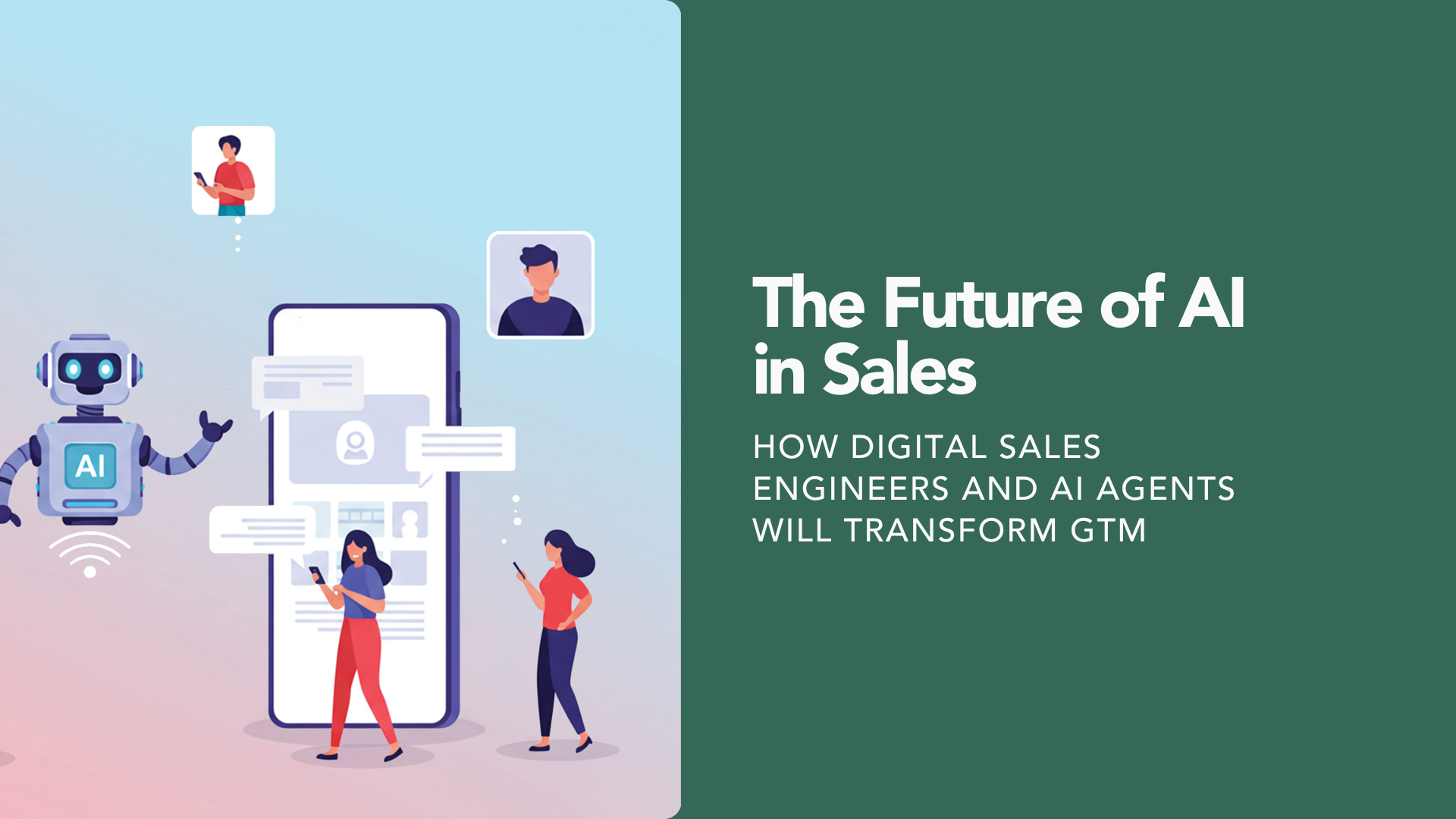The sales landscape is no longer recognizable. Artificial intelligence (AI) is rapidly reshaping go-to-market (GTM) strategies, demanding that sales leaders adapt or risk obsolescence. This transformation isn’t a distant possibility; it’s happening now. Kyle Norton, Chief Revenue Officer of Owner, a company recently valued at over a billion dollars, offers invaluable insights into this AI-driven revolution.
This article explores how AI is transforming sales, the critical role of digital sales engineers, and what the future holds for sales teams by 2025-2026. It’s essential reading for sales leaders, CROs, and anyone invested in the future of sales.
The Evolution of AI in Sales Leadership
The New Requirements for Sales Leaders
Modern sales leadership demands more than just traditional sales acumen; it requires AI fluency. Kyle Norton emphasizes the necessity for sales leaders to be hands-on with AI tools and genuinely curious about their potential. “If your sales leader…is not in the tools and worse not curious, are they going to make it today? You’re cooked,” Norton asserts.
This isn’t just about dabbling with AI; it’s about a fundamental shift in how sales leaders operate. Norton mandates that his team prioritize AI, personally engaging with tools like Clay and ChatGPT to stay ahead of the curve. This hands-on approach allows him to identify the most effective AI implementations and drive adoption across his organization.
The urgency of this transformation is underscored by Norton’s “June 30th deadline,” a call for sales leaders to become AI-native or risk falling behind. The stakes are high, with AI implementation driving significant efficiency gains. Norton reports a 3-4x increase in efficiency per rep due to AI, allowing Owner to invest more heavily in other areas like marketing and post-sales support.
Current State of AI Sales Tools
AI is not just a buzzword; it’s a practical tool that’s already transforming sales processes. Owner leverages Momentum for automated CRM enrichment, enabling reps to focus on high-value activities like sales calls and follow-ups. Momentum automates tasks such as updating CRM records, filling in Salesforce fields, and even alerting managers to potential issues in real-time.
This automation has a tangible impact on revenue-generating activities. Norton reports a 25-30% increase in revenue-generating activity time for his sales team, freeing them from administrative burdens and allowing them to focus on closing deals.
This shift necessitates a reevaluation of traditional sales metrics. While metrics like the number of demos per day remain important, AI enables a focus on higher-level KPIs like revenue-generating activity time. Norton aims to increase this to 70-80%, further optimizing sales team efficiency.
The Transformation of Sales Processes
AI-Driven Sales Efficiency
AI is revolutionizing sales efficiency by automating repetitive tasks and providing reps with real-time insights. Owner’s sales team aims for four demos per day, supplemented by follow-ups and pipeline generation. AI streamlines call preparation, follow-up, and CRM handoff, minimizing administrative overhead.
This efficiency is particularly crucial in SMB sales, where resources are often limited. By automating key processes, AI empowers SMB sales teams to achieve more with less, driving revenue growth and improving customer satisfaction.
The Rise of Digital Sales Engineers
Digital Sales Engineers (SEs) are emerging as a critical component of AI-driven sales teams. These technical professionals bridge the gap between customer needs and technological solutions, leveraging digital tools and automated processes to deliver personalized demonstrations, technical support, and tailored proposals.
Digital SEs excel at:
- Consulting with prospects to identify use cases and propose suitable technology solutions
- Delivering virtual product demos tailored to client needs
- Troubleshooting technical issues before and after the sale
- Providing detailed ROI explanations for technical products
- Acting as liaisons between customers, internal sales teams, and product development groups
Compared to traditional field-based SEs, digital SEs leverage automation tools for scalable outreach, engage buyers asynchronously, and analyze engagement metrics to qualify leads faster. This shift requires a mastery of advanced technologies combined with proficiencies for remote relationship-building.
The Future of Sales Teams (2025-2026)
Hybrid Teams: Humans and AI
The future of sales lies in hybrid teams that blend the strengths of humans and AI. By 2025-2026, CROs will need to manage teams composed of both human sales representatives and AI agents. This requires a new set of skills, including the ability to train and develop AI agents, manage their performance, and ensure seamless collaboration between humans and AI.
Managing a 50/50 team (human/AI agents) requires:
- A deep understanding of AI capabilities and limitations
- The ability to identify tasks best suited for AI vs. humans
- Effective training programs for both human reps and AI agents
- Clear communication and collaboration protocols
Product-Led Growth (PLG) and AI Integration
AI is also transforming product-led growth (PLG) strategies, enabling more intelligent user acquisition, engagement, and adoption. AI-driven personalization, adaptive onboarding, and product analytics are key components of this transformation.
Owner is investing heavily in PLG, implementing One Mind’s superhuman AI to deliver a seamless sales experience. This AI agent answers questions, builds problem awareness, and books meetings, guiding prospects through the sales funnel without human intervention.
This convergence of PLG and AI is blurring the lines between self-serve and assisted sales models. Customers can interact with a product through various channels, from self-service resources to AI agents to human sales reps, choosing the experience that best suits their needs.
Practical Implementation Strategies
Choosing and Implementing AI Tools
Selecting the right AI tools is crucial for success. Norton emphasizes the importance of choosing vendors with strong founder-led teams and a clear vision for the future. He also recommends pushing for pilots to ensure that the tools deliver tangible results.
When implementing AI tools, it’s essential to:
- Start with a clear understanding of your business goals
- Choose tools that align with your specific needs and requirements
- Invest in continuous improvement and training
- Build effective AI knowledge bases
Managing the Transition
Transitioning to an AI-driven sales model requires careful planning and execution. Sales teams need training to effectively use AI tools and adapt to new roles and responsibilities. It’s also important to measure success and ROI to ensure that AI investments are delivering value.
Common challenges include:
- Resistance to change from sales reps
- Lack of AI expertise within the organization
- Difficulty integrating AI tools with existing systems
To overcome these challenges, organizations should:
- Communicate the benefits of AI to sales teams
- Provide comprehensive training and support
- Foster a culture of experimentation and learning
The Impact on Sales Roles and Careers
Evolution of Sales Positions
AI is reshaping sales positions, enhancing some roles and potentially replacing others. Mediocre BDRs focused on qualification may become obsolete, while digital SEs and AI agents will play an increasingly important role.
New skill requirements for sales professionals include:
- AI fluency
- Data analysis
- Technical proficiency
- Remote communication and collaboration
Career development in an AI-driven sales environment requires continuous learning and adaptation. Sales professionals must embrace new technologies and develop the skills needed to thrive in a hybrid human/AI workforce.
Future of the CRO Role
The CRO role is also evolving, requiring systems thinking and AI orchestration. CROs must be able to manage hybrid teams effectively, balancing strategic and tactical responsibilities.
To succeed in the future, CROs must:
- Develop a deep understanding of AI capabilities and limitations
- Build and manage AI-driven sales processes
- Foster a culture of experimentation and learning
- Measure and optimize the performance of hybrid teams
Conclusion
The integration of AI is fundamentally transforming the sales landscape, demanding that sales leaders and organizations adapt to thrive. By embracing AI, investing in training, and fostering a culture of experimentation, sales teams can unlock new levels of efficiency, drive revenue growth, and deliver exceptional customer experiences.
The information presented in this article is based on a conversation with Kyle Norton and supported by industry research. By 2025-2026, the sales landscape will be unrecognizable to those who fail to adapt. Now is the time to prepare for the AI-driven sales future.

